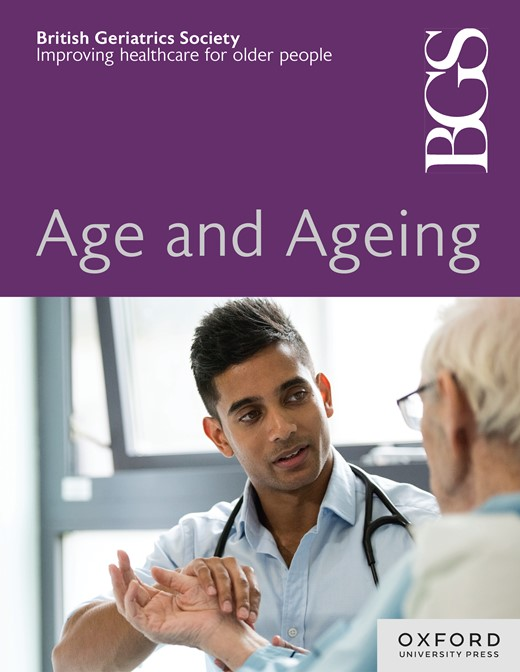未接种疫苗人群中 COVID-19 老年幸存者患老年综合征的风险:一项真实世界的回顾性队列研究
IF 7.1
2区 医学
Q1 GERIATRICS & GERONTOLOGY
引用次数: 0
摘要
背景 我们旨在分析患有和未患有 2019 年冠状病毒病(COVID-19)的老年人患老年综合征的风险差异。方法 我们对 2020 年 1 月 1 日至 2022 年 12 月 31 日期间来自 TriNetX 美国协作网络的患者进行了一项回顾性队列研究。我们纳入了在研究期间接受过至少 2 次严重急性呼吸系统综合征冠状病毒 2(SARS-CoV-2)聚合酶链反应 (PCR) 检测的 65 岁以上患者。我们排除了接种过 SARS-CoV-2 疫苗、在指标日期前确诊患有肿瘤和老年综合症以及在指标日期后 30 天内死亡的人员。指标日期定义为研究期间首次进行 SARS-CoV-2 PCR 检测的日期。对患有和未患有 COVID-19 的倾向得分匹配的老年人进行了八种老年综合征的危险比(HRs)和 95% 置信区间(CIs)估算。同时还对性别和年龄进行了分组分析。结果 经过倾向评分匹配后,共纳入 315 826 名患者(平均 [标准差] 年龄为 73.5 [6.4] 岁;46.7% 为男性,51.7% 为女性)。在COVID-19队列中,认知障碍(HR:3.13;95% CI:2.96-3.31)、抑郁障碍(HR:2.72;95% CI:2.62-2.82)和压力损伤(HR:2.52;95% CI:2.34-2.71)是老年综合征风险相对增加最大的三种疾病。结论 COVID-19 组群中出现老年综合症的风险要高得多。在后 COVID-19 时代,临床医生必须努力预防或尽量减少这些综合症的发生。本文章由计算机程序翻译,如有差异,请以英文原文为准。
The risk of geriatric syndromes in older COVID-19 survivors among the nonvaccinated population: a real world retrospective cohort study
Background We aimed to analyse the differences in the risk of geriatric syndromes between older adults with and without coronavirus disease 2019 (COVID-19). Methods We conducted a retrospective cohort study of patients from the US Collaborative Network in the TriNetX between January 1, 2020, and December 31, 2022. We included individuals aged older than 65 years with at least 2 health care visits who underwent severe acute respiratory syndrome coronavirus 2 (SARS-CoV-2) polymerase chain reaction (PCR) tests during the study period. We excluded those with SARS-CoV-2 vaccination, diagnosis with neoplasm and geriatric syndromes before the index date, and death within 30 days after the index date. The index date was defined as the first date of the PCR test for SARS-CoV-2 during the study period. Hazard ratios (HRs) and 95% confidence intervals (CIs) for eight geriatric syndromes were estimated for propensity score-matched older adults with and without COVID-19. Subgroup analyses of sex and age were also performed. Results After propensity score matching, 315 826 patients were included (mean [standard deviation] age, 73.5 [6.4] years; 46.7% males and 51.7% females). The three greatest relative increases in the risk of geriatric syndromes in the COVID-19 cohort were cognitive impairment (HR: 3.13; 95% CI: 2.96–3.31), depressive disorder (HR: 2.72; 95% CI: 2.62–2.82) and pressure injury (HR: 2.52; 95% CI: 2.34–2.71). Conclusions The risk of developing geriatric syndromes is much higher in the COVID-19 cohort. It is imperative that clinicians endeavour to prevent or minimise the development of these syndromes in the post-COVID-19 era.
求助全文
通过发布文献求助,成功后即可免费获取论文全文。
去求助
来源期刊

Age and ageing
医学-老年医学
CiteScore
9.20
自引率
6.00%
发文量
796
审稿时长
4-8 weeks
期刊介绍:
Age and Ageing is an international journal publishing refereed original articles and commissioned reviews on geriatric medicine and gerontology. Its range includes research on ageing and clinical, epidemiological, and psychological aspects of later life.
 求助内容:
求助内容: 应助结果提醒方式:
应助结果提醒方式:


